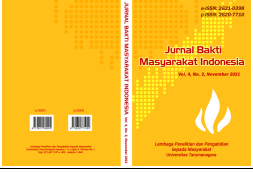PENGEMBANGAN PEMAHAMAN KARAKTERISTIK REMAJA PADA FASILITATOR DAN SPESIALIS DI SEKOLAH X
Main Article Content
Abstract
Online learning and a uniquely individual approach became a challenge for facilitators and specialists at school X. Online data collection was carried out to explore the problems. Data were collected using interviews, observations, and filling out questionnaires to facilitators, specialists, students, school psychologists, principals, and school founders. Results show that facilitators and specialists found that their knowledge of student characteristics in school X is still lacking. They need further knowledge about the general characteristics of adolescents, the youth of Generation Z, and the characteristics of adolescents of school X to adapt the learning methods and tolerate student attitude. The purpose of understanding students is also a form of effort to meet student expectations and run the school as a system. Understanding student input or characteristics has an impact on the process and output of learning. The psychoeducation in online training “Being a Learning Partner for Teenagers” was carried out to meet these needs.The training participants were 24 people. Researchers used qualitative and quantitative methods to see the increase in the knowledge of participants. Qualitatively and quantitatively, the result was an increase in knowledge and specialists on the characteristics of adolescents, the youth of Generation Z, and the characteristics of adolescents of school X. Based on the monitoring, facilitators and specialists were more able to accept, understand, and reduce expectations towards students, adjust the material to provide more visualization, and adjust communication according to the characteristics of students in school X.
ABSTRAK:
Masa pembelajaran daring dan pendekatan individual yang unik menjadi tantangan bagi fasilitator dan spesialis di sekolah X. Penggalian data secara daring untuk mendalami masalah dilakukan melalui wawancara, observasi dan pengisian kuesioner kepada fasilitator, spesialis, siswa-siswi, Psikolog sekolah, Kepala Sekolah, dan pendiri sekolah. Hasilnya ditemukan bahwa fasilitator dan spesialis merasa bahwa pengetahuannya terkait dengan karakteristik remaja Sekolah X masih kurang dan memerlukan pengembangan pengetahuan terkait dengan karakteristik remaja secara umum, remaja generasi Z, dan karakteristik remaja sekolah X untuk dapat menyesuaikan metode pembelajaran dan mentoleransi sikap siswa. Tujuan dalam memahami karakteristik siswa juga merupakan bentuk usaha untuk memenuhi harapan siswa, dan menjalankan sekolah sebagai sistem yaitu memahami input atau karakteristik siswa yang selanjutnya berdampak pada proses dan output dari pembelajaran. Psikoedukasi berbentuk pelatihan daring “Menjadi Teman Belajar untuk Remaja” dilaksanakan untuk memenuhi kebutuhan tersebut. Peserta pelatihan berjumlah 24 orang. Peneliti menggunakan metode kualitatif dan kuantitatif untuk melihat gambaran peningkatan pengetahuan pada partisipan. Secara kualitatif dan kuantitatif tampak bahwa terdapat peningkatan pengetahuan fasilitator dan spesialis terhadap karakteristik remaja baik secara umum, generasi Z, dan karakteristik remaja sekolah X. Berdasarkan hasil monitoring dampak yang dirasakan adalah dapat menerima, memaklumi, dan dapat menurunkan ekspektasi pada siswa; menyesuaikan materi dengan lebih banyak memberikan visualisasi, dan menyesuaikan komunikasi sesuai dengan karakteristik siswa.
Article Details
This work is licensed under a Jurnal Bakti Masyarakat Indonesia https://creativecommons.org/licenses/by-nc-sa/4.0/
References
Bencsik, A., Horváth-Csikós, G., & Juhász, T. (2016). Y and Z Generations at Workplaces. Journal of Competitiveness, 8(3), 90 - 106, https://doi.org/ 10.7441/joc.2016.03.06
Chevalier, J.M. & Buckles, D.J. (2019). Participatory action research: Theory and methods for engaged inquiry (second edition). Oxon: Routlegde.
Drouin, M., & Vartanian, L. R. (2010). Students' feelings of and desire for sense of community in face-to-face and online courses. Quarterly Review of Distance Education, 11(3), 147. Diakses pada tanggal 20 Oktober 2020 dari https://www.pfw.edu/dotAsset/ff3c217c-d596-446d-b10f-6c555fdb1674.pdf
Hampton, D., Welsh, D., & Wiggins, A. T. (2019). Learning preferences and engagement level of generation z nursing students. Nurse Educator, 1. https://doi.org/10.1097/nne. 0000000000000710
Johnson, G.M. & Cooke, A. (2016). An ecological model of student interaction in online learning environments. Dalam Lydia, K.-B., Joseph, B., Esther, N., & Cynthia, A. (2016). Handbook of Research on Strategic Management of Interaction, Presence, and Participation in Online
Courses (Advances in Educational ed., pp. 1–28). Information Science Reference (an imprint of IGI Global). https://doi.org/10.4018/978-1-4666-9582-5.ch001
Seemiller, C. (2017). Motivation, learning, and communication preferences of generation Z students. eHearsay, 4. https://www.ohioslha.org/wp-content/uploads/2017/12/Fall17Issue. pdf#page=5
Seemiller, C., & Grace, M. (2017). Generation z: Educating and engaging the next generation of students. About Campus, 22(3), 21–26. https://doi.org/10.1002/abc.21293
Seemiller, C., & Grace, M. (2017). Generation z: Educating and engaging the next generation of students. About Campus, 22(3), 21–26. https://doi.org/10.1002/abc.21293
Wijayanti, D. (2018). Character education designed by Ki Hadjar Dewantara. EduHumaniora: Jurnal Pendidikan Dasar, 10(2), 85-91. https://ejournal.upi.edu/index.php/ eduhumaniora/article/view/10865



